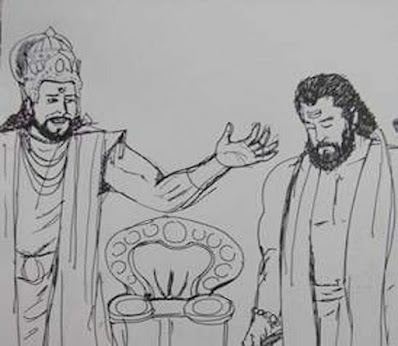
- House of wax
- Draupadi's humiliation
- Greatest war
- Duryodhan denying to return Indraprastha
- Rejection of peaceful Messenger.
- Dronacharya was fighting on behalf of Kauravas
- On the 11th day after Bheeshma fall, he was appointed as commander in chief of the Hastinapur army.
- Duryodhana got the idea to attack Abhimanyu simultaneously when Dronacharya said it's impossible to stop Abhimanyu alone on the 14th day.
Though the world remembers Bhishma as the resolute guardian of the Kuru throne—steadfast, sharp, and composed—there were moments when even his iron will gave way to quiet grief. On the night Vichitravirya died, Bhishma sat alone beneath the stars, atop the palace terrace. The wind carried his sighs, but only the oldest maid of the court saw him weep—not with loud lamentation, but with the weight of a life built on duty. He had renounced his right to marry, to raise sons, all for the throne—and yet, the very bloodline he preserved stood barren again. It was the sorrow of a man who had given everything, and received silence in return.
Years before the great war, when Amba came to him—scorned, rejected, and consumed by fury—Bhishma felt the sting of helplessness. He had abducted her in the name of royal tradition, but could offer her neither marriage nor justice. Bound by his oath, he stood unmoved. Yet within, he broke. That night, he wandered the banks of the Ganga and whispered into the river’s flow, “Let her curse come true. Let my end be hers to command.” It was the first time Bhishma longed for death—not in battle, but in shame.
During the Kurukshetra war, a moment arrived when the battle paused, not because of weapons, but because of revelation. Krishna, enraged by Arjuna’s hesitation, lifted a chariot wheel like a discus and charged at Bhishma. Krishna had sworn not to fight, yet his love for Arjuna overpowered that vow. Bhishma dropped his weapons, knelt, and opened his arms—not in surrender, but in recognition. In that flash of divine fury, Bhishma no longer saw a mortal ally, but Vishnu himself. He was ready to die, not by an enemy's hand, but at the feet of God.
In some forgotten versions of the tale, there’s a story of Bhishma unknowingly meeting Karna in disguise. They exchanged thoughts on dharma, warfare, and the loneliness of honor. Both men felt a kinship neither could explain, as if they shared a wound that never healed. Bhishma later suspected the truth—this was Kunti’s firstborn, the one warrior who bore both nobility and bitterness in equal measure. Still, he chose silence, perhaps because he saw in Karna what he himself might have become, had life allowed him the dignity of choice.
Long after the war had ended, as Bhishma lay on his bed of arrows, Draupadi visited him. No longer the queen who had been humiliated before the court, she stood beside him as a daughter might before her elder. Bhishma, weakened yet lucid, asked for her forgiveness. He admitted his silence during her insult had haunted him more than any sword. Draupadi, strong and solemn, touched his feet and replied softly, “A daughter forgives where a queen cannot.” That moment, more than any hymn or salutation, brought him peace.
His end, too, was not a fall of defeat, but a fulfillment. When Shikhandi stood before him in battle, Bhishma lowered his bow. To others it seemed like a tactical decision. But within, Bhishma saw destiny unfold. He recognized the soul of Amba in Shikhandi’s body. He knew this was not vengeance—it was balance. He once told Dronacharya, “I do not fear death. I fear pride that cloaks itself in justice. Let the one I wronged deliver what I deserve.”
These were the moments that made Bhishma more than a warrior. They made him human. A man not only of vows and victories, but of wounds, regrets, and rare glimpses of tenderness that history rarely speaks of.


Comments
Post a Comment